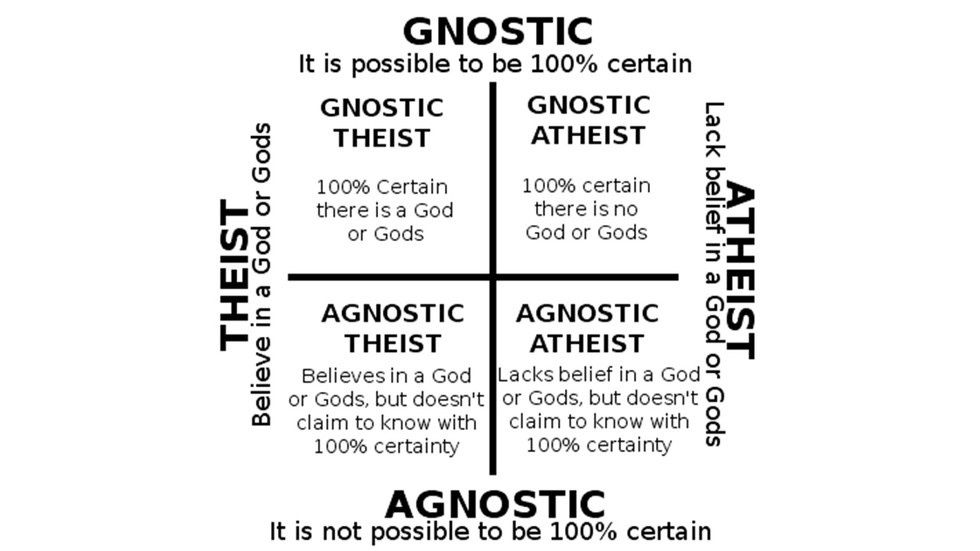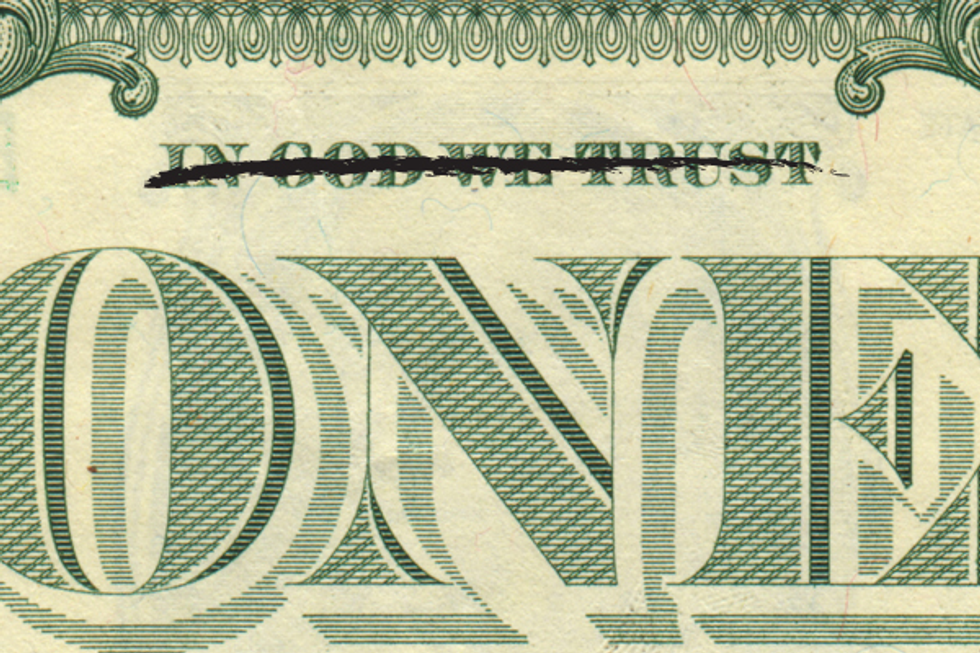As with any identity that is not mainstream, especially ones that have a stigma attached to them, you will have to reveal that identity to others throughout your entire life and it won't always be easy. The process of doing so, I have learned, is called "coming out." I am thankful that my identities, although very heavily still discriminated against a lot of places, are generally accepted in Michigan. While I do not consider myself to be LGBT+, I have learned a lot from that community. The most important thing that I have learned is how much tougher it can be to go through life with such identities. I have also learned, however, that with a strong community and people who are willing to be bold and help others to understand, great strides can be made to increase acceptance by society. Because of this I want to help clarify some labels in a community that I do identify with—the secular community—if nothing more than to clarify the names I call myself.
I've had this conversation so many times before, but recently I find myself becoming more quickly emotionally charged when it comes up even if the person asking is genuinely curious, patient, and kind. Earlier in my life I was ready to argue, ready to debate, ready to prove someone wrong. But I learned that being so combative, although usually satisfying in the short term, only serves to inhibit others' understanding of my position and reinforces that I am just an angry atheist in their mind. Even though I've learned, I still get a rush of those feelings to be combative whenever the topic arises.
Here is a snip from a recent conversation I had:
"So you don't believe in anything?!" She inquired with a tone that suggested that she was both genuinely curious, but also wanting to provoke me. I stumbled on words while I tried to organize the flood of thoughts that poured in.
"Well—"
"Like, nothing? What do you think made all of this? It couldn't have just come from nothing!" She continued, further complicating my thoughts. This is the classic steamrolling that usually accommodates me telling people that I'm atheist.
She stops there because although she is anxious to know more about my position, she knows that she first has to give me time to answer. My problem is trying to figure out where to begin with people. How much background do I need to give? What do they believe that we should talk about first so that they can understand where I'm coming from and why I consider myself an atheist? What else will they try to argue with me about?
I have some space and time here to actually calmly answer some of these questions here, so let me start from the beginning. I identify as an agnostic atheist, secular humanist, and aweist. For a lot of people, these identities usually get condensed to "atheist or something". So, let me un-condense these words:
Agnostic
This one means different things to different people. To some it is a religious position, to others it is more general. The definition of Gnostic from dictionary.com is:
"1. Pertaining to knowledge; 2. Possessing knowledge, especially esoteric knowledge of spiritual matters"
It also is where the suffix -gnosis came from. Such as 'diagnosis' (to distinguish knowledge). Basically when you use the word gnostic, you are making a claim on your knowledge of something or your potential to know something. So, when I say that I am agnostic I am saying that I don't know, or can't know one way or another about a certain topic. Usually, people use gnostic or agnostic in terms of religious doctrine, but one can be agnostic about anything. For example, I am agnostic about aliens. They may exist, they may not (and it depends on how you define 'alien'), but I don't know and maybe I never can know depending on if physics will allow faster than light travel someday.
So, when I say that I am agnostic, it means that I don't know if a god or a set of gods exist, and I don't even know if it is possible to know (until death, of course — and not near-death, but that is a whole different conversation).
Atheist
Oh boy, the big scary one for most people. This is the one that usually scares off a date. Atheist. A-theist. This one is mainly self explanatory. A-, meaning the absence of and theism meaning the belief in a god. So yes, I don't believe in a god. A theist does. But let me make a clarification:
Just because I don't believe in a god doesn't mean I don't believe in anything. It's super annoying to hear this, but I get why that's where someone would jump if they've never actually met an atheist. Here's the thing (and it took me awhile to realize this too), just because I don't believe in a god doesn't mean that I'm not religious, or that I don't believe in anything supernatural. In fact, I could be atheist and believe in an afterlife where I will see all of my dead relatives. I could believe in a lot of things like unicorns, leprechauns, fairies, karma, reincarnation, spiritual energies, chakras, and a whole bunch of other things so long as they didn't involve a deity. I know many people who are atheist but believe in many other supernatural things.
You might be thinking that I've just set up a giant contradiction for myself. How can I be agnostic and atheist? To an extent, you're right. I'm not purely either. I do believe that I don't know if a god exists and that I can't probably ever know. You can never logically prove that a god doesn't exist because it is impossible to prove a negative. As an example, you can not prove that a black swan doesn't exist because you have no searched every single atom of this universe (and potential parallel universes, etc.). However, you can prove that a black swan exists (which they do). One could prove that a god exists, which is why as of now, at least, I hold a position of agnosticism toward any gods. They may exist, but - and here is where the atheist part comes in - I'm pretty sure that no god exist. I'm open to be proven wrong, but my leaning and my lifestyle is one that does not take into account a god acting on my life. So, I am an agnostic atheist.
Here is a nice little diagram...
Now onto the next couple labels.
Secular
From dictionary.com again:
"1. of or relating to worldly things or to things that are not regarded as religious, spiritual, or sacred; temporal:
2. not pertaining to or connected with religion (opposed to sacred )"
This word has many implications, but basically it means that there is no religion involved. Secularism, for instance, is the idea of church-state separation.
Humanist
I have an article that briefly explains this word a bit more, but basically Humanism is recognizing that humans have intrinsic value. Humanism recognizes that we should constantly put ourselves in each other's shoes and understand the problems that others are facing.
So, Secular humanism is a moral stance on life and one that does not utilize a religious text to derive what is right or wrong. It is something that positively defines me. It is something that gives me a basis for a community that can come together and do positive things through. Organizations such as Sunday Assembly and Center For Inquiry are some examples of this positive label coming into fruition. Secular Humanism is what motivates me to be kind to others. It motivates me to volunteer. It motivates me to participate in social justice movements. It is a standard, like any good standard, that is impossible to achieve.
Aweist
This is actually a new label for me, but ever since I've heard of it, I have really taken a liking to it. It comes from Phil Zukerman's Living the Secular Life.
"Awesim encapsulates the notion that existence is ultimately a beautiful mystery, that being alive is a wellspring of wonder, and that the deepest questions of existence, creation, time, and space are so powerful as to inspire deep feelings of joy, poignancy, and sublime awe. Aweism humbly, happily rests on a belief that no one will ever really know why we are here or how the universe came into being, or why, and this insight renders us weak in the knees while simultaneously spurring us on to dance."
There are so many wonderful and beautiful and mysterious things in nature an all around us. There are so many things that give me pause - that make me humbled. I have never felt the need to believe in a god to experience this sense of awe. I think it is something that is inherent in humans and something that serves to unite us against all odds.
Intersectionality
Each identity comes with its privileges and its hardships, but I am all of these. These are my identities and a look through a keyhole at what they entail. I hope that this article has helped you to better understand folks who identify on the secular spectrum. These are only my labels and my understanding of these labels. Others may identify with the same word, but understand the words to mean very different things. There are many other identities on the secular spectrum, and I invite you to explore and learn about them all.
Stay skeptical, my friends.



























